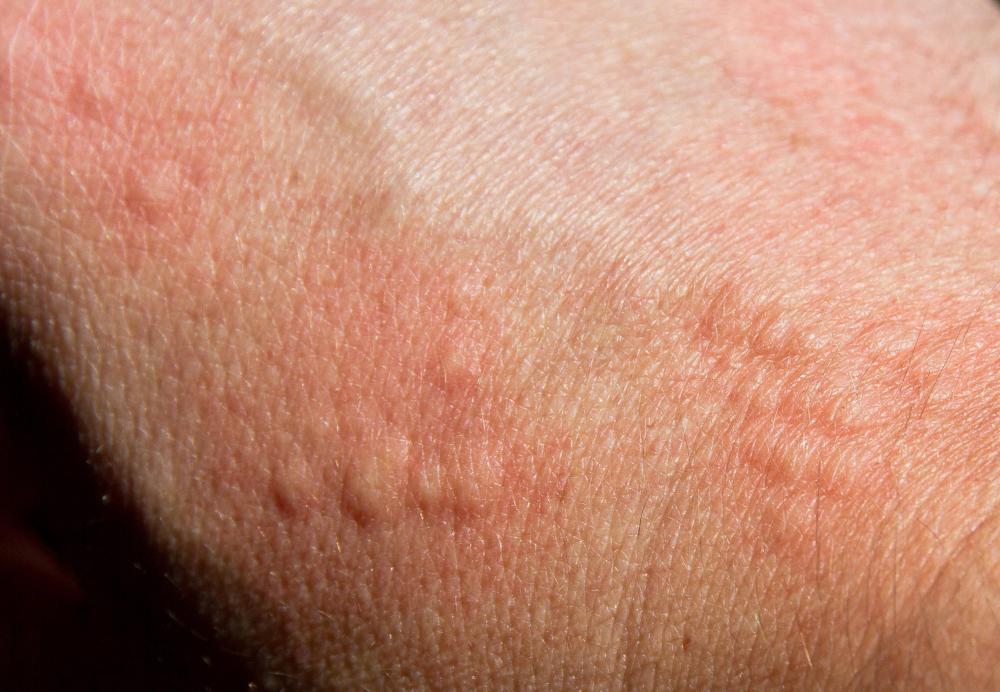At WiseGEEK, we're committed to delivering accurate, trustworthy information. Our expert-authored content is rigorously fact-checked and sourced from credible authorities. Discover how we uphold the highest standards in providing you with reliable knowledge.
What are the Safety Concerns About Hydroquinone Cream?
Hydroquinone cream, commonly known as a key ingredient in topical skin-lightening ointments such as Esoterica® and Melquin®, can have mild to severe side effects when used in the common 2% and 4% hydroquinone concentrations. These occur most commonly when it is used in conjunction with other substances — like Vitamin A, peroxide, salicylic acid, or sunscreen — and can include minor redness or a light burning sensation. Severe side effects are generally the result of an allergic reaction or pre-existing condition. These can vary from rashes to skin darkening, cracking, or hives.
Most users notice a greater incidence of negative reactions to hydroquinone cream in the skin around the nose, eyes, and mouth — especially nearest to mucous membranes. The skin in these areas is often more sensitive, and more susceptible to damage. Such symptoms are generally temporary and non-threatening, and can include dry, cracked skin, redness, itching, crusting, and burning. If symptoms persist, users should consult a physician.

More dangerous allergic reactions are typically characterized by breathing problems, tightness in the chest, blisters, rashes, hives, and irritation beyond that caused in a mild reaction. Those with skin allergies should check the particular ingredients of hydroquinone-based creams prior to use. Even those with no documented allergies should discontinue use the moment allergic symptoms appear.

Others potentially at risk may include pregnant or breastfeeding women. Although no negative effects of hyroquinone cream have been reported in such situations, it is unknown just how much of the key ingredients absorb into the system, and what effect they might have on either a developing fetus or breastfeeding child. Most healthcare professionals generally suggest avoiding the risk of such unknown side effects. Use is also not advised for children under age 13.

The most severe reaction is known as exogenous ochronosis. In this, hydroquinone cream causes skin to progressively darken rather than lighten. The effect has been reported most often in Africans, African-Americans, and others with hereditary dark skin, especially those who have previously used skin whitening creams with high concentrations of hydroquinone.

Hydroquinone cream is generally considered a safe, mild topical ointment. As it works by inhibiting enzymatic reactions in the skin, however, the chance of an adverse chemical reaction is always possible. Instructions usually advise applying the cream to a small test area for a short period of time to determine any adverse reaction before actual use.

Doctors usually advise caution for those with sensitive skin, eczema, psoriasis, asthma, or previous history of poor reactions to topical creams that affect melanine production. Should skin discoloration or burning occur, doctors may recommend either ceasing use or using a hydroquinone cream with a lower concentration of this active ingredient.
AS FEATURED ON:
AS FEATURED ON:















Discussion Comments
My best friend is Japanese and she told me that many Japanese women use hydroquinone cream to lighten their skin tone. This was shocking to hear because Japanese women are already very fair. My friend also said that some women's skin tone has changed and looks almost bluish now because of hydroquinone creams.
I wanted to mention this as a warning to those using hydroquinone cream. As far as I know, the changes caused by this cream are permanent, so it's a good idea to used this cream very moderately and for only a short period of time.
@ddljohn-- I have heard this claim more than once but I am not sure about its accuracy. I think there are studies which have shown that hydroquinone could increase the risk of cancer. This is probably why some countries have banned hydroquinone products altogether. But I'm not sure if this connection has been fully established because many people still use this type of cream. I think the risk of cancer is great for darker skinned individuals who use hyroquinone cream for a long period of time.
Using hydroquinone excessively is not a good idea, not just because of the risk of cancer but also because it will cause skin to darken after a while as the article said.
Is it true that hydroquinone cream causes skin cancer?
Post your comments